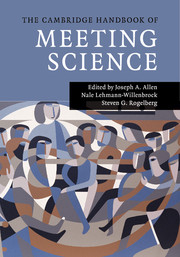Book contents
- The Cambridge Handbook of Meeting Science
- The Cambridge Handbook of Meeting Science
- Copyright page
- Dedication
- Contents
- Tables
- Figures
- Contributors
- Book part
- Part I Introduction
- Part II Premeeting Activities and Context
- Meeting Setup
- Meeting Composition
- Premeeting Communication
- Macro Meeting Context
- Part III The Meeting Itself
- Part IV Special Types of Meetings
- Part V Synthesis and Conclusion
- Book part
- Author Index
- Subject Index
- References
Premeeting Communication
from Part II - Premeeting Activities and Context
Published online by Cambridge University Press: 05 August 2015
- The Cambridge Handbook of Meeting Science
- The Cambridge Handbook of Meeting Science
- Copyright page
- Dedication
- Contents
- Tables
- Figures
- Contributors
- Book part
- Part I Introduction
- Part II Premeeting Activities and Context
- Meeting Setup
- Meeting Composition
- Premeeting Communication
- Macro Meeting Context
- Part III The Meeting Itself
- Part IV Special Types of Meetings
- Part V Synthesis and Conclusion
- Book part
- Author Index
- Subject Index
- References
Summary
Premeeting talk (PMT) consists of the verbal and behavioral interactions that occur before a meeting begins. Such talk can be classified as one of four types: small talk, meeting preparatory talk, shop talk, and work talk. Empirical research on PMT is still in its preliminary stages; thus far, only two studies have focused on PMT, and only small talk has been found to be a significant predictor of meeting effectiveness, above and beyond good meeting procedures. Although PMT is often considered to be insignificant and trivial, initial research on the small talk variation suggests that it has the potential to positively affect an upcoming meeting. Theoretical support for the effects of PMT can be found in a variety of mechanisms, including those found in research on the ripple effect, affective events theory, setting the tone in groups/teams, and emotional contagion. We discuss why investigating how each variant of PMT may be influenced by personality factors is an area that merits further attention, as well as why certain PMT findings in one setting may not be generalizable to other environments. Finally, we conclude the chapter by discussing the future direction of PMT research and provide practical suggestions for managers.
- Type
- Chapter
- Information
- The Cambridge Handbook of Meeting Science , pp. 151 - 174Publisher: Cambridge University PressPrint publication year: 2015

